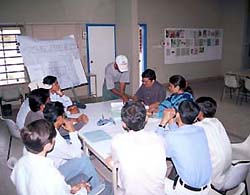7. The Orangi Pilot Project
 |
| OPP staff teach volunteer
students how to make basic maps for the laying of sewage pipes (taken in
an OPP office) |
Let us look at the activities of another NGO. The Orangi Pilot Project (OPP)
began operating in the Orangi district in Karachi. Orangi is an informal settlement
built by private firms and residents “illegally,” outside the plans
of the local administrative authorities. The settlement has now “developed,” and
boasts a population of one million. However, as it was developed illegally,
Orangi lacked adequate urban infrastructure such as electricity, water and
sewage systems. Discovering through rounds of consultations with local residents
that the most urgent issue there was the improvement of sanitary conditions,
OPP provided guidance on the laying of sewage pipes to local residents. The
residents themselves dug up streets in front of their houses and installed
sewage pipes. Eventually, they built a massive sewage system by connecting
the pipes they had laid. This became a well-known example of residents themselves
taking the initiative in an area normally covered by the administration, and
where the results of their efforts made direct dialogue with the local authorities
possible. At present, OPP does not confine its activities to just the Orangi
twon, but provides consultancy services at the national level, mainly in the
area of improving residential environments, to NGOs working in slums across
the country or at the request of local governments.
Most of Orangi residents who backed OPP’s early activities by actually
participating were Biharis, or people who fled Bangladesh (East Pakistan) and
had relatively high educational backgrounds. The leader of OPP, Akhtar Hameed
Khan, was well known among Biharis as a figure who had previously developed
an effective formula for rural development in Komilla, East Pakistan.
